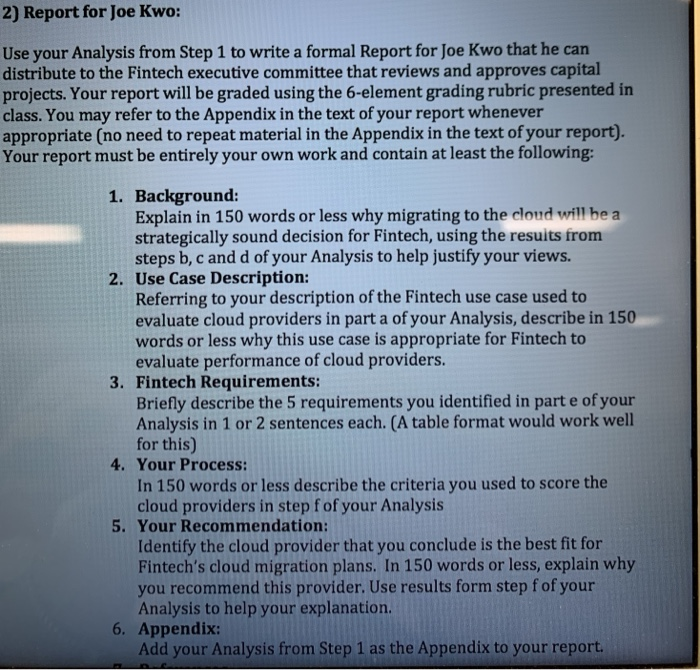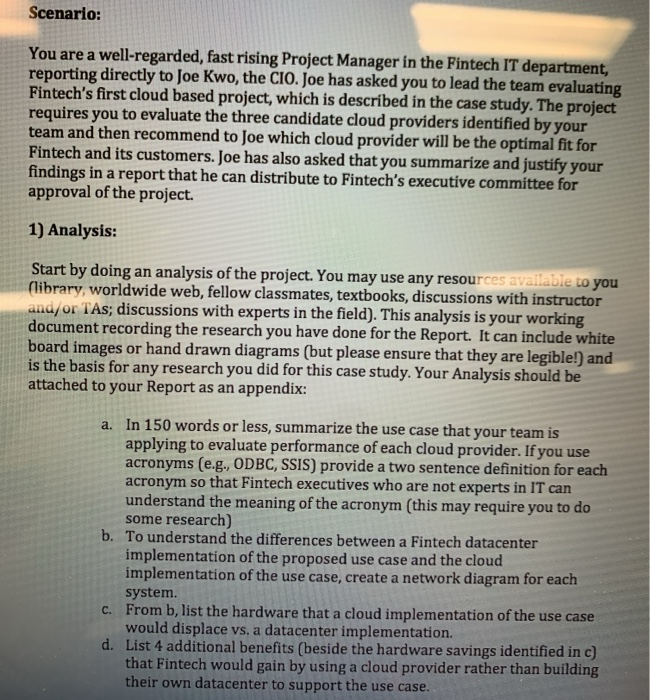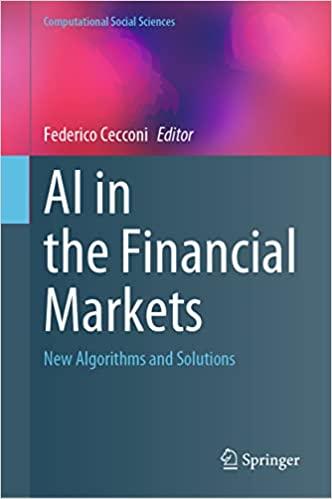2) Report for Joe Kwo: Use your Analysis from Step 1 to write a formal Report for Joe Kwo that he can distribute to the Fintech executive committee that reviews and approves capital projects. Your report will be graded using the 6-element grading rubric presented in class. You may refer to the Appendix in the text of your report whenever appropriate (no need to repeat material in the Appendix in the text of your report). Your report must be entirely your own work and contain at least the following: 1. Background: Explain in 150 words or less why migrating to the cloud will be a strategically sound decision for Fintech, using the results from steps b, c and d of your Analysis to help justify your views. 2. Use Case Description: Referring to your description of the Fintech use case used to evaluate cloud providers in part a of your Analysis, describe in 150 words or less why this use case is appropriate for Fintech to evaluate performance of cloud providers. 3. Fintech Requirements: Briefly describe the 5 requirements you identified in part e of your Analysis in 1 or 2 sentences each. (A table format would work well for this) 4. Your Process: In 150 words or less describe the criteria you used to score the cloud providers in step fof your Analysis 5. Your Recommendation: Identify the cloud provider that you conclude is the best fit for Fintech's cloud migration plans. In 150 words or less, explain why you recommend this provider. Use results form step fof your Analysis to help your explanation. 6. Appendix: Add your Analysis from Step 1 as the Appendix to your report. Scenario: You are a well-regarded, fast rising Project Manager in the Fintech IT department, reporting directly to Joe Kwo, the CIO. Joe has asked you to lead the team evaluating Fintech's first cloud based project, which is described in the case study. The project requires you to evaluate the three candidate cloud providers identified by your team and then recommend to Joe which cloud provider will be the optimal fit for Fintech and its customers. Joe has also asked that you summarize and justify your findings in a report that he can distribute to Fintech's executive committee for approval of the project. 1) Analysis: Start by doing an analysis of the project. You may use any resources available to you (library, worldwide web, fellow classmates, textbooks, discussions with instructor and/or TAs; discussions with experts in the field). This analysis is your working document recording the research you have done for the Report. It can include white board images or hand drawn diagrams (but please ensure that they are legible!) and is the basis for any research you did for this case study. Your Analysis should be attached to your Report as an appendix: a. In 150 words or less, summarize the use case that your team is applying to evaluate performance of each cloud provider. If you use acronyms (e.g., ODBC, SSIS) provide a two sentence definition for each acronym so that Fintech executives who are not experts in IT can understand the meaning of the acronym (this may require you to do some research) b. To understand the differences between a Fintech datacenter implementation of the proposed use case and the cloud implementation of the use case, create a network diagram for each system. C. From b, list the hardware that a cloud implementation of the use case would displace vs. a datacenter implementation. d. List 4 additional benefits (beside the hardware savings identified in c) that Fintech would gain by using a cloud provider rather than building their own datacenter to support the use case. e. Identify and list the top five requirements that a cloud provider has to meet to be suitable for Fintech's planned migration to the cloud; rank these requirements (most critical requirement is ranked 1); justify your requirements and their ranking by quoting the case study f. Create a table with each provider as a column in the table and the five requirements as rows. Score each provider on a scale of 1-5 for each requirement (5: meets requirement fully; 1: cannot support the requirement); include a TOTAL row containing the sum of scores in each column. The provider with the highest score is most likely the best provider. 2) Report for Joe Kwo: Use your Analysis from Step 1 to write a formal Report for Joe Kwo that he can distribute to the Fintech executive committee that reviews and approves capital projects. Your report will be graded using the 6-element grading rubric presented in class. You may refer to the Appendix in the text of your report whenever appropriate (no need to repeat material in the Appendix in the text of your report). Your report must be entirely your own work and contain at least the following: 1. Background: Explain in 150 words or less why migrating to the cloud will be a strategically sound decision for Fintech, using the results from steps b, c and d of your Analysis to help justify your views. 2. Use Case Description: Referring to your description of the Fintech use case used to evaluate cloud providers in part a of your Analysis, describe in 150 words or less why this use case is appropriate for Fintech to evaluate performance of cloud providers. 3. Fintech Requirements: Briefly describe the 5 requirements you identified in part e of your Analysis in 1 or 2 sentences each. (A table format would work well for this) 4. Your Process: In 150 words or less describe the criteria you used to score the cloud providers in step fof your Analysis 5. Your Recommendation: Identify the cloud provider that you conclude is the best fit for Fintech's cloud migration plans. In 150 words or less, explain why you recommend this provider. Use results form step fof your Analysis to help your explanation. 6. Appendix: Add your Analysis from Step 1 as the Appendix to your report. Scenario: You are a well-regarded, fast rising Project Manager in the Fintech IT department, reporting directly to Joe Kwo, the CIO. Joe has asked you to lead the team evaluating Fintech's first cloud based project, which is described in the case study. The project requires you to evaluate the three candidate cloud providers identified by your team and then recommend to Joe which cloud provider will be the optimal fit for Fintech and its customers. Joe has also asked that you summarize and justify your findings in a report that he can distribute to Fintech's executive committee for approval of the project. 1) Analysis: Start by doing an analysis of the project. You may use any resources available to you (library, worldwide web, fellow classmates, textbooks, discussions with instructor and/or TAs; discussions with experts in the field). This analysis is your working document recording the research you have done for the Report. It can include white board images or hand drawn diagrams (but please ensure that they are legible!) and is the basis for any research you did for this case study. Your Analysis should be attached to your Report as an appendix: a. In 150 words or less, summarize the use case that your team is applying to evaluate performance of each cloud provider. If you use acronyms (e.g., ODBC, SSIS) provide a two sentence definition for each acronym so that Fintech executives who are not experts in IT can understand the meaning of the acronym (this may require you to do some research) b. To understand the differences between a Fintech datacenter implementation of the proposed use case and the cloud implementation of the use case, create a network diagram for each system. C. From b, list the hardware that a cloud implementation of the use case would displace vs. a datacenter implementation. d. List 4 additional benefits (beside the hardware savings identified in c) that Fintech would gain by using a cloud provider rather than building their own datacenter to support the use case. e. Identify and list the top five requirements that a cloud provider has to meet to be suitable for Fintech's planned migration to the cloud; rank these requirements (most critical requirement is ranked 1); justify your requirements and their ranking by quoting the case study f. Create a table with each provider as a column in the table and the five requirements as rows. Score each provider on a scale of 1-5 for each requirement (5: meets requirement fully; 1: cannot support the requirement); include a TOTAL row containing the sum of scores in each column. The provider with the highest score is most likely the best provider









